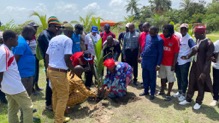
Dawda Badjie, who was speaking during the launching of the second phase of coconut tree planting along the coastline from Senegambia to Jinack Island, North Bank Region, said such activities seek to benefit the coastal communities and help to attract certain aspects of climate change such as social, economic and environmental consideration of people’s wellbeing.
The project was supported by the Global Climate Change Alliance GCCA+ Climate Resilient Coastal and Marine Zone project for the Gambia and funded by the European Union in partnership with the government of The Gambia.
The project aims at consolidating results and positive experiences of the previous GCCA project “support to The Gambia for Integrated Coastal Zone Management (ICZM) and the mainstreaming of climate change” 2013-2016.
“Over 60 per cent of The Gambia's population lives around the coastal zones - measuring about 80 kilometers of an open zone line and a 200 kilometer of the center zone”, executive director said.
He added that planting trees along the coast is not something new but the result overtime is not encouraging. “We have been planting trees but we don’t take care of them”, Mr. Badjie stressed.
He further warned that this could easily disappear in the near future if concerted effort to protect the coastal zone of the country is not calculated. “We are working to make sure that we restore Gambia’s lost ecosystem.”
Kemo Fatty, executive director for Green Up Gambia, expressed concern over the country’s vulnerability to sea level rise. He said studies indicated that Banjul is about one meter off sea level rise. Half of the city would be inundated and the entire capital city of Banjul would be left uninhabited if nothing is done, he warned.
“And we may equally lose valuable mangroves ecosystems. More than 30% of our mangroves will disappear – which simply means the breathing ground of fish stocks will go down and most of the people are depending on inland fishing on the ocean for their needs,” Mr. Fatty pointed out.
Wurrah Bah, deputy director of administration at the Kanifing Municipality Council, revealed their commitments to supporting the eco-system restoration of the GCCA+ project which aims to plant 4000 coconut trees along the coastline zones.
Michelle Mendy, councillor, Essau Ward, also described the project as a great initiative and promised to work with the youth in making sure they sustain the planting of the trees.





